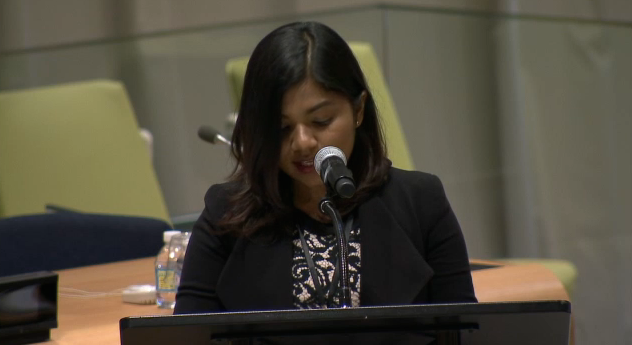
21 April 2016, New York : On Tuesday 21 April 2016 the United Nations (UN) adopted a new framework which places people at the centre of global drug policies on control, during the thirtieth UN General Assembly Special Session on the World Drug Problem. The Maldives, during its statement to the session, noted that it believes this session, the first Special Session since the adoption of the Agenda 2030, provides a unique opportunity to galvanize international cooperation to effectively address and counter the world drug problem.
Ms. Zeena Mohamed Didi, Second Secretary at the Permanent Mission of the Maldives to the UN, who delivered the statement during this session, stressed that the political will and ability of all members to implement evidence-based policies and practices, based on reliable data, science and analysis, in line with the three international conventions on drug matters, is critical to combat this global problem.
The Maldives also stressed that there is no one-size-fits all solution to countering the world drug problem and that each country's policies must address its own specific needs. The Maldives also elaborated its National Strategy to tackle the issues of drugs which is based on four complimentary and action oriented pillars: 1) prevention, 2) treatment and social reintegration, 3) governance and system development and 4) efforts to reduce drug supply. Elaborating on the provisions of the new Drug Act of 2011, Maldives noted that the legislations allows for the prevention of the use, peddling and trafficking of drugs and provide measures to motivate drug dependent persons to enrol in treatment and rehabilitation programmes with a view to facilitate their reintegration into the community as responsible citizens. The Government is also collaborating with rehabilitation centres in neighbouring countries, to allow for requests to seek rehabilitation overseas, as allowed by the Drug Act. "The Maldives national drug policies are underpinned not just by our firm conviction on the need to build safer and just societies, but also supported by human rights principles, which places people at the centre", the Maldives further noted.
Illicit trade of narcotics and its related activities go beyond national borders, representing a global challenge. There exists a clear nexus between drugs, transnational organised crime and terrorism, threatening the international peace and security. To effectively combat the world drug problem, enhanced regional and international cooperation is imminent. In line with this objective, Maldives is working with its regional member countries to establish a regional coordination centre for South Asia. The Maldives concluded it will continue to engage domestically and internationally on the World Drug Problem, and will continue to do its part in advancing the international drug policy agenda to create a more peaceful, healthier and just society.



